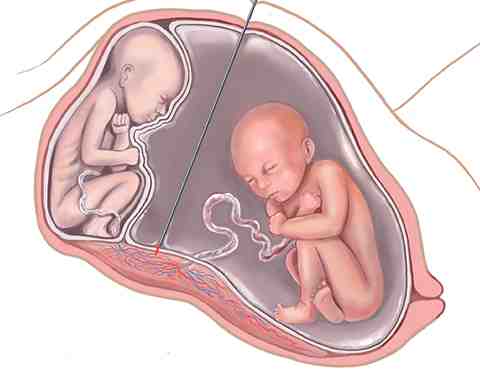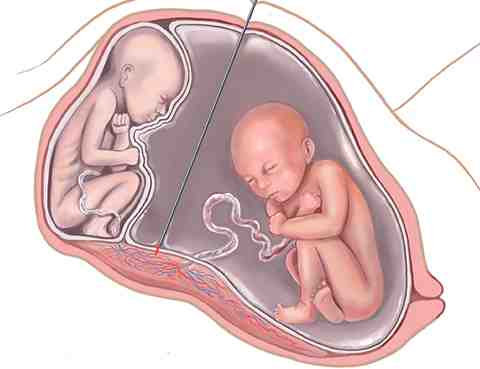Twin-to-Twin transfusion syndrome (TTTS) is a rare pregnancy condition that affects identical twins or higher gestations. If you’re looking for the diagnosis and treatment of twin-to-twin transfusion syndrome (TTTS) in Pune, then reach out to Dr Tejas Tamhane.
Most pregnancies progress smoothly, without any complications. However, certain conditions require specialised treatment for the mother and the baby. This is particularly true when the mother carries multiples like twins or triplets. Twin-to-twin transfusion syndrome (TTTS) is one such condition that can happen in monochorionic twins (identical twins who share the same placenta).
Twin-to-Twin Transfusion Syndrome (TTTS) In Pune: An Overview
Twins can either be fraternal or identical. Most are fraternal twins – meaning that each fetus develops from a separate egg and sperm. Fraternal twins have their own placentas and amniotic sacs and may not look alike. Identical twins, on the other hand, are rare and happen when one fertilized egg splits and develops into two fetuses. Identical twins may share a placenta but each baby usually has its own amniotic sac.

Twin-to-Twin Transfusion Syndrome (TTTS) is a serious pregnancy condition that affects identical twins (or higher-order multiples) who share a single placenta. This can develop in about 10 to 15% of monochorionic pregnancies. In TTTS, abnormal blood vessel connections within the shared placenta cause an imbalance in blood flow between the twins. One twin called the ‘donor’ gives away more blood than it receives, while the ‘recipient’ twin gets too much blood which can strain its heart and lead to excess amniotic fluid.
Twin-to-twin transfusion syndrome is a progressive condition meaning it gets worse if not treated timely. If TTTS is left untreated, it can cause serious complications for both twins. It usually develops between weeks 16 and 26 of pregnancy and can easily be detected through an ultrasound.
Precious Clinic for Advanced Fetal Medicine is renowned for detecting and treating twin-to-twin transfusion syndrome in Pune.

Donor Twin
The donor twin gets less blood from the placenta and as a result, has less blood volume. This can lead to restricted growth and reduced amniotic fluid.
Recipient Twin
The increased blood volume in the recipient twin can lead to heart problems. This twin often develops too much amniotic fluid, which can cause pressure and other issues during the pregnancy.
What Causes Twin-to-Twin Transfusion Syndrome?
There are no genetic or hereditary reasons for TTTS. It can develop randomly but only in identical twin pregnancies where both fetuses share a placenta (monochorionic).
Twin-to-Twin Transfusion Syndrome Diagnosis
Twin-to-Twin Transfusion Syndrome is typically diagnosed during routine prenatal ultrasounds, which monitor the growth and development of twins. The diagnosis is made based on several signs including disparity in the twins’ amniotic fluid levels, size difference between the twins and imbalanced blood flow.

Diagnostic Steps Include:
- Ultrasound Imaging: This is the primary tool for diagnosing TTTS. A significant difference in the amniotic fluid levels between the twins is a strong indicator. More often than not, one twin will have too much fluid (polyhydramnios), while the other will have too little (oligohydramnios).
- Doppler Ultrasound: This scan measures the blood flow in the umbilical cords and hearts of both twins, providing information on whether the blood flow is uneven or abnormal.
- Fetal Echocardiography: Fetal echo may be used to assess the heart function of the recipient twin, which can be strained due to the excessive blood it receives.

Management and Treatment of TTTS
Management and treatment of this condition will depend on its stage and severity. In mild cases, regular monitoring is usually sufficient. However, in moderate to severe cases, more invasive intervention may be necessary. One common procedure done for this is laser photocoagulation, a procedure performed during minimally invasive fetoscopy. This technique involves using a laser to seal off the abnormal blood vessels in the placenta, thereby reducing the blood flow imbalance between the twins.
In other cases, amnioreduction can also be an option to remove excess amniotic fluid around the recipient twin. In severe cases where the health of both twins is critically compromised, early delivery may be considered.
Twin-to-Twin Transfusion Syndrome In Pune
Twin-to-Twin Transfusion Syndrome is a complex and serious complication that requires careful monitoring and management. If you are pregnant with multiples and anxious about it, then talking to an expert can be incredibly beneficial. You can consider consulting Dr Tejas Tamhane, the best fetal medicine specialist in Pune, who can answer all your queries on TTTS and related concerns.
Twin-to-Twin Transfusion Syndrome in Pune
If you’re looking for the diagnosis and treatment of twin-to-twin transfusion syndrome (TTTS) in Pune, then reach out to Dr Tejas Tamhane, the best fetal medicine specialist.

